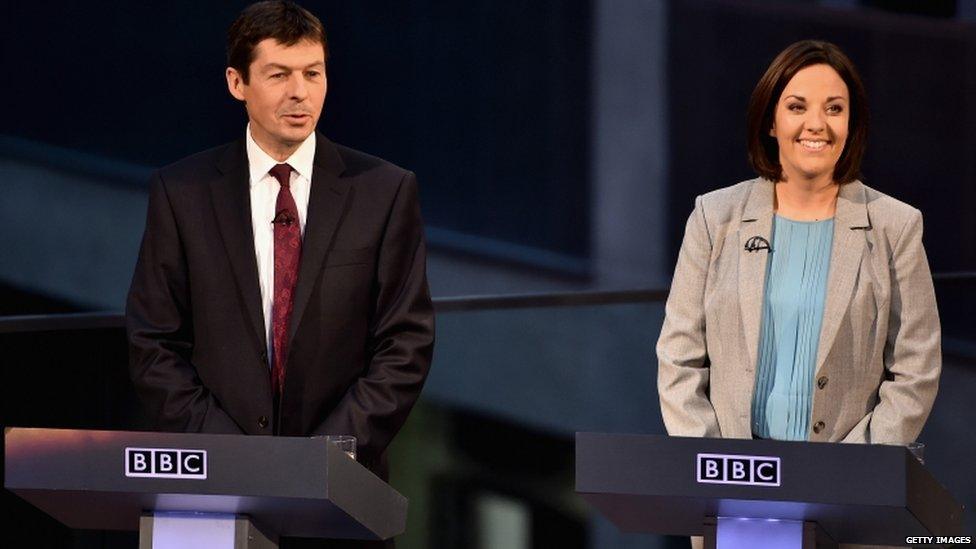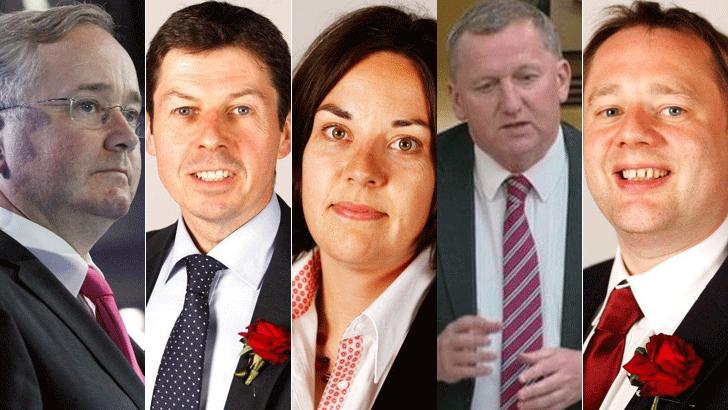Can the next Scottish Labour leader rebuild the party's fortunes?
- Published

MSPs Ken Macintosh and Kezia Dugdale are contesting the leadership of the Scottish Labour Party
On Saturday Scottish Labour will announce their new leader, in the hope that a new face at the top can turn around their fortunes before critical elections to the Scottish Parliament next year.
Jim Murphy stood down as Scottish leader after just six months in the job when the party suffered a near wipe out in the General Election in May.
The task of rebuilding the party in Scotland is vital for the party as a whole.
Unless they win back a substantial number of the seats they lost to the SNP, Labour will almost certainly never form a government in Westminster again.
If they fail to regain their Scottish heartlands they would have to instead win seats in England that even Tony Blair could not conquer in 1997.
The scale of the problem Labour faces in Scotland is demonstrated by a new TNS poll published in the Herald newspaper, external which suggests 62% of voters intend to vote SNP at next year's Holyrood poll.
That would be a huge increase on the 50% who voted SNP in the general election.
The Scottish Labour Party got a huge shock when they lost 40 of their 41 Scottish seats in May's general election. But it should not have come as a surprise. They have been in trouble in Scotland for years.
One of their previous leaders - former First Minister Henry McLeish - admits the party has been taking voters for granted in Scotland. He told me they had become complacent and entitled.
Asked if the party had now hit rock bottom he said: "I hope so, but I fear we may not have reached our nadir."
Scottish Labour leadership contest
Who has a vote?
15,000
Party members
6,000
Affiliated and registered supporters
He thinks that during last year's Scottish independence referendum campaign Labour won the battle but lost the hearts and minds of Scottish voters.
There are two candidates competing to take over the leadership.
Kezia Dugdale is the clear frontrunner. She is just 33 years old and claims it is time for a new generation to take over a party that needs rebuilding from the ground up.
During a period as acting leader she frequently took on Nicola Sturgeon at First Minister's Questions in some heated exchanges.
Ken Macintosh is a more experienced politician who has been a member of the Scottish Parliament since it was first created in 1999.
He says the Labour party has become too confrontational, especially in its dealings with the SNP. He says Labour needs to be less tribal, less partisan.
This is not an ideological struggle. They are significantly not to the left or right of each other. Both are fairly centrist candidates.
In fact when Ken Macintosh ran for the leadership in 2011 Ms Dugdale helped to run his campaign. They both talk about the need to win back voters' trust rather than radically changing their policies.
There are some in the party who think it will be impossible for Labour to win back Scotland unless they uncouple themselves from the UK party and finally throw off the accusation that the Scottish party is nothing more than a "branch office".

Scottish Labour leaders
Donald Dewar (May 1999 - October 2000)
Henry McLeish (October 2000 - November 2001)
Jack McConnell (November 2001 - August 2007)
Wendy Alexander (September 2007 - June 2 008)
Iain Gray (September 2008 - December 2011)
Johann Lamont (December 2011 - October 2014)
Jim Murphy (December 2014 - June 2015)

Henry McLeish is convinced the party needs complete autonomy.
He said: "It would be beneficial for us to be the voice of Scotland and we can't do that if we are mixing it on an agenda with English voters."
But that is problematic for a party which spent last year arguing against independence for the country. Why now advocate an independent party? Both leadership candidates have ruled out the idea of a separate Scottish party.
When the new party leader is announced on Saturday he or she will become the eighth leader since devolution in 1999.
Every time the Scottish party hits a set back they respond by changing the leader.
Now, having chewed through seven in fifteen years, the eighth face a greater challenge than any of their predecessors.
- Published20 July 2015

- Published15 June 2015
